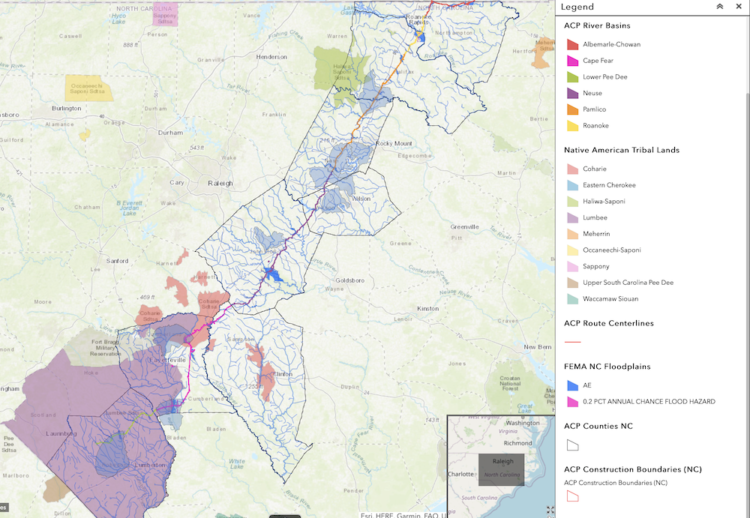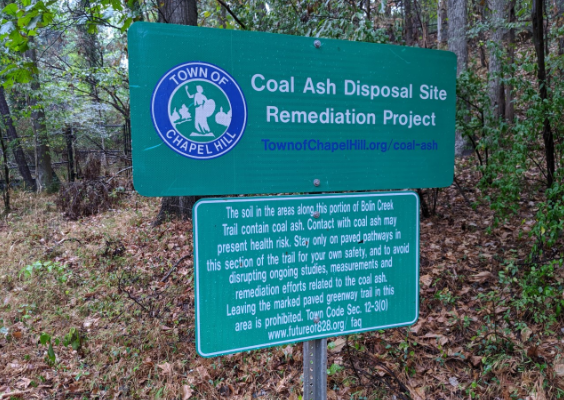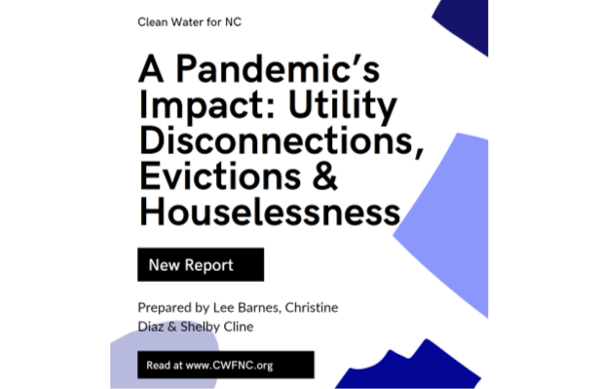By: Lisa Sorg, NC Policy Watch
October 28, 2021
Advocates cry foul as future of thousands of easements in North Carolina and Virginia remains uncertain
Dominion Energy laid claim to 3,100 tracts of private land along the Atlantic Coast Pipeline route, including hundreds in North Carolina, but the company is not immediately returning that acreage to property owners, even though the project has been cancelled.
Now property rights and environmental advocates, as well as landowners themselves, are asking federal officials to formally intervene.
Under the name ACP, LLC, Dominion and its main corporate partner in the project, Duke Energy, had negotiated, often under landowner duress, permanent and temporary easements — or had invoked eminent domain — to take private property.
Some of the properties were to be used for the pipeline right-of-way itself; other purposes included access roads and equipment storage. ACP contractors cut trees, drilled under the Tar River and excavated deep maws in the land for the pipeline.
Then in July 2020, ACP announced they were cancelling the 600-mile project. Court challenges, schedule delays and cost overruns had made the project untenable. At that point, ACP had no use for the easements other than the legally required environmental restoration. Nonetheless, ACP can hold onto the permanent easements for a project that will never be built.
“Duke and Dominion have publicly stated that they do not intend to voluntarily relinquish the easements back to landowners,” wrote Clean Water for North Carolina, a nonprofit environmental group, to the Federal Energy Regulatory Commission last month. “Nor do they have plans to transfer the easements to a third party for use in another infrastructure project.”
Dominion spokesman Aaron Ruby told Policy Watch the company will need access to the easements to complete the environmental restoration, required by FERC.
Ruby said once FERC approves the restoration plan, it will take Dominion about 18 months to complete it, plus two to three years of post-restoration monitoring. “In the meantime, we’re addressing individual requests related to easements on a case-by-case basis,” Ruby said.
But in a filing to FERC, Dominion acknowledged that ACP “expects landowners to abide by the terms of their individual easement agreements,” which for permanent easements could be “in perpetuity” — forever.
Only a third of the 3,100 easements had been “disturbed,” and no work had been done on the remaining 2,000 tracts. Property rights advocates argue Dominion should surrender those easements if the landowners request it.ACP has been using and destroying my property for about three and a half years without having to pay me a thing.” — Donovan McLaurin
Ruby said ACP could still need to use those undisturbed easements “to gain access to other areas that have. As you can imagine, the restoration process is very complex, and every property is different.”
Terms of the easements varied, but all of them restricted landowners from using all of their property, including valuable farmland. The easements also place an “encumbrance” on the title to the land, restrictions that could deter potential buyers and decrease the value of the property. Many of the agreements stipulate that the easements can be used only for one natural gas pipeline, but others are more open-ended.

Some easements contain an end date. But many do not, potentially affecting the use of the land for generations. “Unless legal action is taken, those easements will forever ‘cloud the title,’ impacting future use and future sales of those properties,” said Cathy Cralle Jones, an attorney who successfully represented several landowners against the ACP.
While it is true that eminent domain is generally handled under state law, North Carolina does not address this particular situation in its statutes. But absent state protections, said Veronica Saavedra Oakler, executive director of Clean Water for North Carolina, the ACP is no longer adhering to the “public use and benefit” provision under the National Gas Act.
“Even though the project alleged to be for the ‘public good’ has now vanished, the recorded easements prevent landowners from building, from sub-dividing, or doing anything with their land that might violate the terms of the recorded easement,” Cralle Jones said.
Complicating matters, the easement terms vary from landowner to landowner. In North Carolina alone, there are dozens of heir properties involved. Heir properties are rural lands owned chiefly by Black families who have inherited land from their ancestors by an operation of the law, rather than by will or deed transfer.
ACP previously stated it would not ask landowners it paid for the easements to reimburse the company.
In comments about the Draft Supplemental Environmental Impact Statement, FERC wrote, “contractual issues regarding easement questions are not environmental issues and are outside the scope” of those considerations.
“That is false,” said Tiferet Unterman, an attorney with the Niskanen Center, a Washington, D.C.-based advocacy organization. FERC has broad authority to decide what occurs on the easements, she said.
The Center represents many landowners, including Donovan McLaurin, who lives near Wade, in Cumberland County. ACP had obtained a court order allowing it to seize 11 acres of McLaurin’s land, defacing the property with hills of dirt two stories tall and gashes in the earth, Policy Watch reported last year.
“FERC often sets conditions on what pipelines can or cannot do with the land, down to what kind of grass seed the pipeline can use,” Unterman said. “These landowners are in this position because FERC approved an unnecessary and destructive pipeline, so FERC should use its broad authority to help get these landowners out of this mess by requiring, at the very least, that ACP release all restrictions on the easements.”
The Center also argued to FERC that easements granted under the threat of eminent domain “are inherently coercive and that payments do not fairly compensate landowners.”
Last March, the Blue Ridge Environmental Defense League wrote a letter to Attorney General Josh Stein asking for help. “The threat and impacts of the Atlantic Coast Pipeline remain— hanging over communities like the proverbial sword of Damocles. We urge you to act now to protect property owners in Eastern North Carolina,” wrote Therese Vick, sustainable communities campaign coordinator.
However, Stein’s office did not intervene.
As of September, McLaurin said in court documents that since ACP seized his land, “I have not received any payment from ACP.
“ACP has been using and destroying my property for about three and a half years without having to pay me a thing.”





